Senators, Scientists, Join with
Patient Advocates to Support Promising Medical Research,
Somatic Cell Nuclear Transfer (aka “Therapeutic
Cloning”)
|

 |
March 5, 2002
|
| Christopher Reeve; Senators
Kennedy, Specter, and Feinstein; Nobel Prize Winner;
Activists; and Parents Say SCNT Could Mean New
Treatments, Cures; Urge Senate
OK |
Washington,
DC—Christopher Reeve, medical researchers, and patient
advocates, on behalf of the Coalition for the Advancement of
Medical
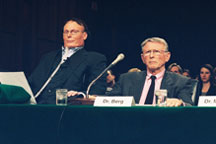 |
|
Christopher
Reeve and Dr. Peter Berg of Stanford University
Medical School. |
| |
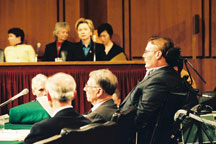 |
|
Hillary Rodham
Clinton listens to the testimony.
|
| |
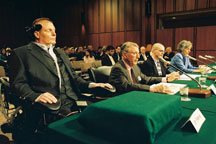 |
|
Dr. Peter Berg
addresses the panel. |
| |
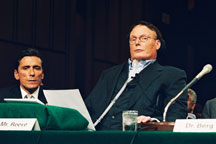 |
|
Michael
Manganiello, CRPF Director of Government Relations and
newly appointed President of the Coalition for the
Advancement of Medical Research (CAMR) assists in the
debate. |
| |
 |
|
Hillary Rodham
Clinton takes a moment to greet Christopher
Reeve. |
| |
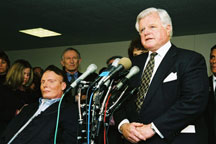 |
|
Senator Edward
Kennedy addresses the media at the press
conference. |
| |
 |
|
Christopher
Reeve meets the press in his efforts to support somatic
cell nuclear transfer and its research
potential. |
| |
| |
| |
| |
| |
| |
| |
| |
| |
| |
| | Research (CAMR), joined today
with Senators Edward Kennedy (D-MA), Arlen Specter (R-PA),
Diane Feinstein (D-CA), and others to urge the Senate to
support an important research pathway, somatic cell nuclear
transfer (SCNT), otherwise known as “therapeutic
cloning.”
“SCNT gives hundreds
of millions of people around the world who are afflicted with
a wide variety of diseases and disabilities exactly the kind
of chance that we need,” said Reeve, Chairman of the
Christopher Reeve Paralysis Foundation, in remarks at a press
conference shortly before he testified at a hearing on SCNT by
the Senate Health, Education, Labor, and Pensions
Committee.
Senate leaders,
patient advocates, and prominent scientists support SCNT,
because it could lead to new treatments and cures for the more
than 100 million Americans facing now-incurable illnesses such
as cancer, Parkinson’s, Alzheimer’s, diabetes, ALS, and spinal
cord injury.
Although SCNT
fundamentally is different from reproductive cloning, drawing
support from the National Academy of Sciences and leading
doctors and medical researchers around the country, it would
be banned under legislation that goes to the Senate floor in a
few weeks.
“For me, SCNT is about
hope—the hope that science may find a way to help my two-year
old daughter, who cannot walk, talk, comprehend, or use her
hands because she has the incurable genetic disorder, Rett
Syndrome,” said Elizabeth Johns Howard, mother of Allison, who
spoke at the press conference.
Given the scientific
potential in this area, CAMR strongly opposes any legislative
or regulatory action that would ban research related to SCNT.
However, CAMR does support efforts to prohibit human
reproductive cloning while protecting important areas of
medical research, including stem cell research.
The Coalition for
the Advancement of Medical Research (CAMR) is comprised of
nationally-recognized patient organizations, universities,
scientific societies, foundations, and individuals with
life-threatening illnesses and disorders advocating for the
advancement of breakthrough research and technologies in
regenerative medicine including stem cell research and somatic
cell nuclear transfer in order to cure disease and alleviate
suffering.
|

